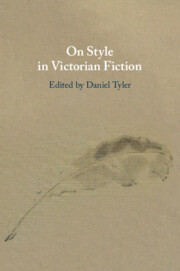Book contents
- On Style in Victorian Fiction
- On Style in Victorian Fiction
- Copyright page
- Contents
- Notes on Contributors
- Acknowledgements
- Chapter 1 On Style: An Introduction
- Part I Aspects of Style
- Chapter 2 Novel Poetics: Three Studies in the Craft of Style
- Chapter 3 Not Straightforward: Characteristics of the Psychology of Grammar in the Victorian Realist Novel
- Chapter 4 Why Always Dorothea? The Rhetorical Question in Canon and Archive
- Chapter 5 Victorian Transport
- Chapter 6 Telegraphy
- Part II Authors
- Select Bibliography
- Index
Chapter 6 - Telegraphy
from Part I - Aspects of Style
Published online by Cambridge University Press: 23 December 2021
- On Style in Victorian Fiction
- On Style in Victorian Fiction
- Copyright page
- Contents
- Notes on Contributors
- Acknowledgements
- Chapter 1 On Style: An Introduction
- Part I Aspects of Style
- Chapter 2 Novel Poetics: Three Studies in the Craft of Style
- Chapter 3 Not Straightforward: Characteristics of the Psychology of Grammar in the Victorian Realist Novel
- Chapter 4 Why Always Dorothea? The Rhetorical Question in Canon and Archive
- Chapter 5 Victorian Transport
- Chapter 6 Telegraphy
- Part II Authors
- Select Bibliography
- Index
Summary
Responding to critics who argue that telegraphy is an analogy for style (or at least for realism) in Victorian fiction, in this chapter David Trotter argues conversely that it is in fact inimical to style. Telegraphic communication, while hard to represent, or distasteful in its crudeness, could not be ignored. The novelists understood that it could be essential to human intercourse and, on occasion, oddly romantic. Daniel Deronda is the example par excellence.
- Type
- Chapter
- Information
- On Style in Victorian Fiction , pp. 93 - 108Publisher: Cambridge University PressPrint publication year: 2022

